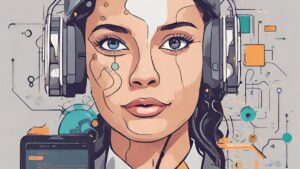Balancing the Promise and Peril of AI-Generated Personal Statements with UTPs.
In today’s rapidly evolving digital landscape, where artificial intelligence (AI) has become an integral part of our lives, a new innovation known as the Universal Talent Passport (UTP) is turning heads. For instance, our TalentPass app, currently in development, is designed to help individuals craft biographical content and personal statements for various applications, ranging from immigration and education to employment and grants. While this technology holds tremendous potential to simplify and enhance these processes, it also raises significant concerns and challenges that must be carefully weighed.
The Promise of TalentPass: A “Trusted Digital Representative“
One of the primary promises of TalentPass is its ability to assist individuals in generating detailed and authentic personal statements. By tapping into a wealth of data, including an individual’s experiences, skills, and achievements, TalentPass can help create compelling narratives that accurately represent who they are. This innovation aims to serve as a “Trusted Digital Representative” for users, offering numerous potential benefits:
- Streamlined Application Processes: With TalentPass, individuals can automate the creation of application materials, reducing the time and effort required for each submission. This streamlined process can be particularly valuable for students, job seekers, and immigrants facing complex application requirements.
- Informed Decision-Making: TalentPass can provide users with valuable insights and recommendations, helping them understand their eligibility for various opportunities. This information empowers individuals to make informed choices about their educational and career paths.
- Enhanced Access to Services: By assisting users in crafting comprehensive personal statements, TalentPass can increase their chances of accessing essential services, such as financial aid, grants, and social support programs.
The Peril of AI-Generated Personal Statements: The Challenge of Authenticity
While TalentPass offers numerous advantages, it also introduces challenges related to authenticity and transparency. The reliance on generative AI prompts concerns about distinguishing between content generated by an individual’s memory and AI-generated narratives. This raises critical issues:
- Lack of Human Touch: Critics argue that AI-generated personal statements may lack the genuine human touch that makes narratives relatable and emotionally compelling. Admissions committees and employers may become skeptical of narratives that feel overly polished or artificial.
- Ethical and Plagiarism Concerns: The use of AI to generate personal statements poses ethical questions about authorship and authenticity. Users must ensure that their AI-generated content adheres to ethical standards and avoids plagiarism.
- Transparency and Accountability: Establishing clear guidelines for disclosing AI assistance in personal statements is essential. Individuals must be transparent about their use of AI tools to maintain trust and accountability in the application process.
The Way Forward: Safeguards and Responsible Use
To harness the potential benefits of TalentPass while mitigating the associated risks, several safeguards and best practices should be considered:
- Transparency: Users should be encouraged to disclose the use of AI assistance in their personal statements. Admissions committees, employers, and other stakeholders can then evaluate narratives with full awareness.
- Ethical Guidelines: Educational institutions, employers, and organizations should develop ethical guidelines for using AI-generated content in the application process. These guidelines can emphasize authenticity and integrity.
- AI Training and Bias Mitigation: Developers of AI systems like TalentPass should prioritize ongoing training and bias mitigation to ensure that generated content aligns with ethical and cultural standards.
- User Education: Individuals using AI tools should receive education on responsible AI usage. This includes understanding the limitations of AI and the importance of human oversight.
The Potential Paradigm Shift: UTP as a New Standard
In conclusion, the Universal Talent Passport (UTP) has the potential to revolutionize how individuals represent themselves in various applications. By becoming a “Trusted Digital Representative,” UTP systems like TalentPass can simplify complex processes, inform decision-making, and enhance access to opportunities. However, the challenges related to authenticity and transparency must not be underestimated.
The responsible use of AI-generated personal statements is crucial for maintaining trust and integrity in application processes. With the implementation of safeguards, ethical guidelines, and user education, it is possible to strike a balance between harnessing the power of AI and preserving the authenticity of personal narratives.
As we navigate this evolving landscape, the adoption of UTP as a new standard for self-presentation holds the potential to empower individuals and transform how we approach applications and opportunities in the digital age. By embracing this innovation responsibly, we can unlock the promise of AI while upholding the core principles of authenticity and transparency.





